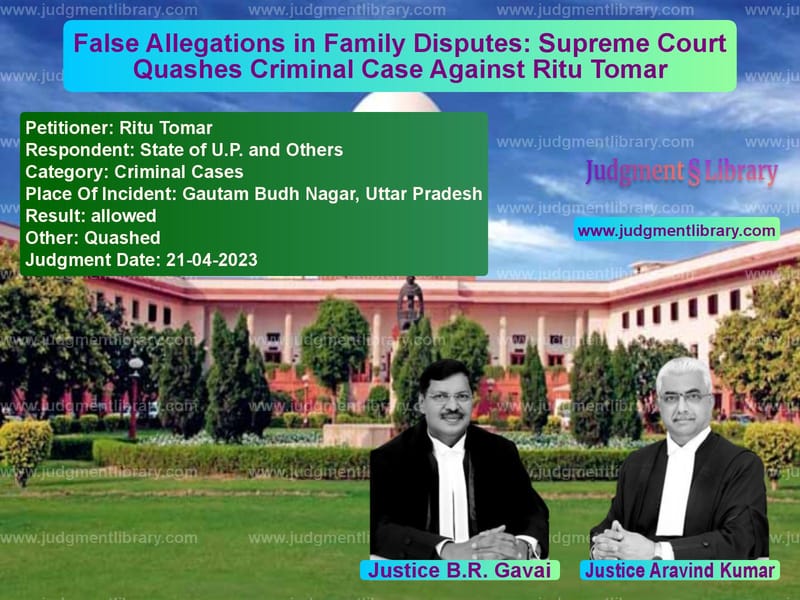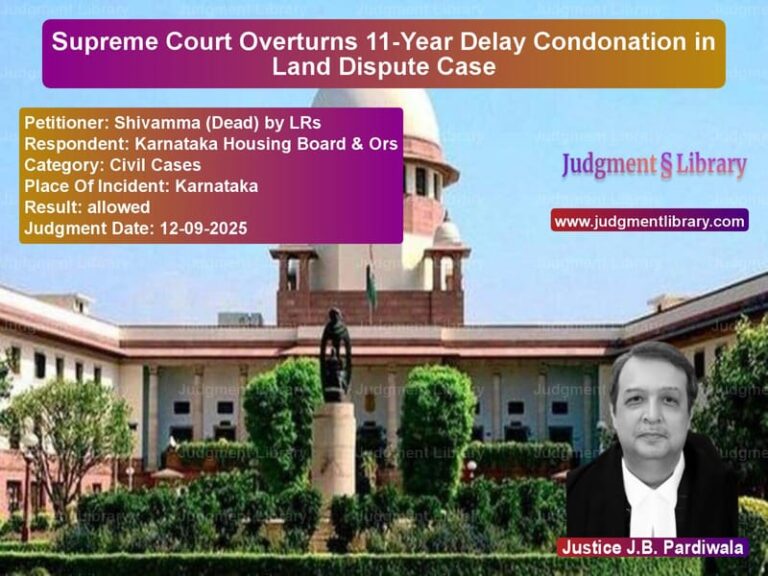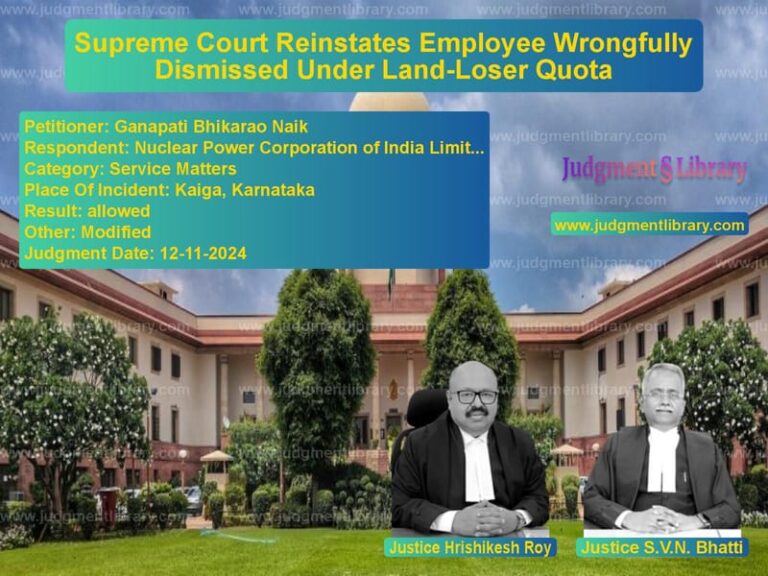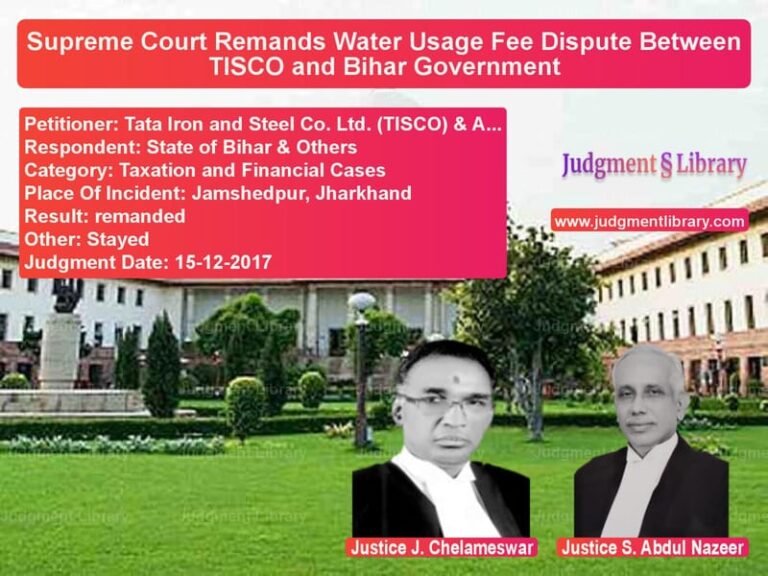False Allegations in Family Disputes: Supreme Court Quashes Criminal Case Against Ritu Tomar
The Supreme Court of India has delivered a significant judgment in the case of Ritu Tomar vs. State of Uttar Pradesh, setting aside a criminal case that arose from a family dispute. The case, which revolved around allegations of forced entry, assault, and intimidation, was found to be based on fabricated claims aimed at pressuring the appellant’s sister in a separate dowry harassment case. This ruling sheds light on the misuse of criminal law in matrimonial disputes and reinforces the principle that courts must ensure cases are based on credible evidence.
Background of the Case
The case originates from a matrimonial dispute involving the appellant’s sister, Rekha, who was married to the complainant (third respondent) in 2011. The marriage eventually deteriorated, leading to multiple legal actions between the families. Rekha filed for maintenance under Section 125 Cr.P.C. and also lodged a dowry harassment complaint under Section 498A IPC and the Dowry Prohibition Act.
As a countermeasure, the complainant filed an application under Section 156(3) Cr.P.C., alleging that Rekha’s family members, including Ritu Tomar, forcibly entered his house, assaulted him and his father, and pressured him to sell his property and relocate to Delhi. Based on this complaint, an FIR was registered under multiple sections of the Indian Penal Code (IPC), including:
- Section 147 – Rioting
- Section 148 – Rioting with a deadly weapon
- Section 149 – Unlawful assembly
- Section 452 – House trespass
- Section 324 – Voluntarily causing hurt by dangerous weapons
- Section 307 – Attempt to murder
- Section 342 – Wrongful confinement
- Section 506 – Criminal intimidation
Proceedings in the High Court
Ritu Tomar approached the Allahabad High Court under Section 482 Cr.P.C. seeking to quash the FIR, arguing that the allegations were fabricated and intended to harass her and her family. However, the High Court dismissed her petition on May 30, 2018, stating that the matter required trial for proper adjudication.
Arguments Before the Supreme Court
Petitioner (Ritu Tomar)
Ritu Tomar challenged the FIR, contending that:
- The allegations were false and retaliatory, filed only to counter the dowry case against the complainant.
- The local police investigation had already found that the alleged incident never took place.
- No witnesses, including neighbors, supported the complainant’s version of events.
- The complainant had a vested interest in pressuring his wife to withdraw her pending legal cases.
Respondent (State of Uttar Pradesh and Others)
The State opposed the appeal, asserting that the magistrate had properly exercised discretion in directing the police to register an FIR. The respondents contended that the matter should proceed to trial where all aspects could be examined.
Supreme Court’s Observations and Judgment
The Supreme Court scrutinized the case and found that the FIR was based on unfounded claims. Key findings included:
- The local police had already submitted a report stating that the allegations were false and lacked evidentiary support.
- No independent witnesses corroborated the complainant’s claims.
- The magistrate’s order to register the FIR did not provide any rationale for rejecting the police report.
- The complainant’s actions indicated an intention to use the criminal justice system as a tool for harassment.
Key Excerpt from the Judgment
“In the factual background of there being dispute between two families, which had already resulted in filing of two cases by the wife, and the fact that none of the villagers including the neighbors of the complainant supported the occurrence of any incident as claimed, the irresistible conclusion to be drawn by this court is to accept the report of the jurisdictional police where under they have arrived at a conclusion that incident projected by the complainant appears to be false, and thereby the proceedings against the appellant deserve to be quashed.”
With this reasoning, the Supreme Court quashed the FIR and dismissed all criminal proceedings against Ritu Tomar.
Legal Implications of the Judgment
This ruling establishes a crucial precedent in family disputes involving false criminal allegations. The judgment reinforces the principle that:
- Magistrates must provide clear reasons when ordering FIR registration despite contrary police findings.
- Courts should not allow the criminal justice system to be misused for personal vendettas in family disputes.
- Police investigations must be given due consideration before proceeding with criminal prosecution.
Conclusion
The Supreme Court’s decision in Ritu Tomar vs. State of Uttar Pradesh highlights the importance of judicial scrutiny in preventing the misuse of criminal law. The ruling underscores that criminal proceedings should not be initiated without sufficient evidence and that courts must safeguard individuals from retaliatory legal actions. This judgment serves as a vital safeguard against the exploitation of legal provisions to settle personal scores.
Petitioner Name: Ritu Tomar.Respondent Name: State of U.P. and Others.Judgment By: Justice B.R. Gavai, Justice Aravind Kumar.Place Of Incident: Gautam Budh Nagar, Uttar Pradesh.Judgment Date: 21-04-2023.
Don’t miss out on the full details! Download the complete judgment in PDF format below and gain valuable insights instantly!
Download Judgment: ritu-tomar-vs-state-of-u.p.-and-ot-supreme-court-of-india-judgment-dated-21-04-2023.pdf
Directly Download Judgment: Directly download this Judgment
See all petitions in Dowry Cases
See all petitions in Bail and Anticipatory Bail
See all petitions in Attempt to Murder Cases
See all petitions in Judgment by B R Gavai
See all petitions in Judgment by Aravind Kumar
See all petitions in allowed
See all petitions in Quashed
See all petitions in supreme court of India judgments April 2023
See all petitions in 2023 judgments
See all posts in Criminal Cases Category
See all allowed petitions in Criminal Cases Category
See all Dismissed petitions in Criminal Cases Category
See all partially allowed petitions in Criminal Cases Category







